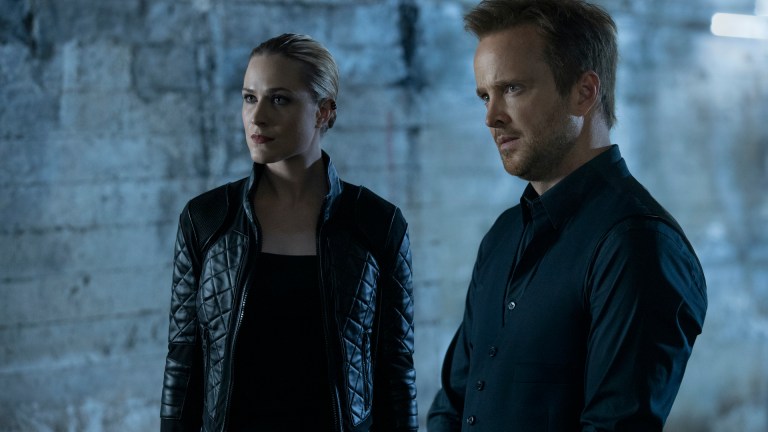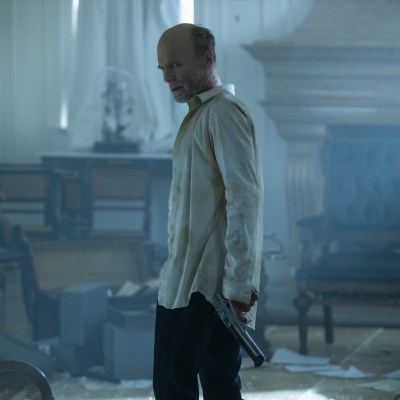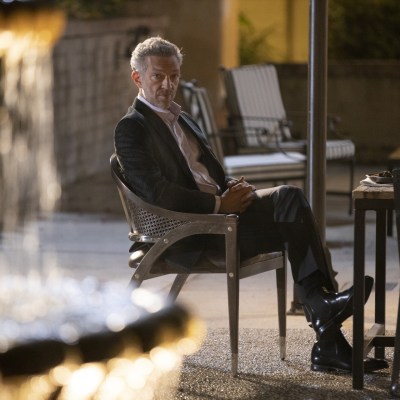Westworld Season 3 Episode 5 Review: Genre
If you could look into the future and see your ultimate fate, would you? For the people on Westworld, that's no longer a choice.

This Westworld review contains spoilers.
Westworld Season 3 Episode 5
There’s a reason that, when someone is going to give you bad news, they suggest that you sit down for it. They don’t yell it to you across a crowded subway, or wait until you’re about the blow out the candles on your birthday cake before announcing that someone you love has died or something else equally terrible.
It’s never easy to tell how someone is going to take bad news, and that gamut of reactions is seen across the background players of this week’s episode of Westworld. Dolores (Evan Rachel Wood) has ripped the veil off of humanity, and people are getting to take a good, hard look at just what Rehoboam thinks of them and their fitness to continue to be part of the tapestry of human existence. Tapestries tend to only be as strong or as beautiful as their weakest strand.
Westworld, given freedom from having to maintain a layer of confusing mystery around everything, seems to be able to dive a little deeper into genre territory given a more straightforward mystery story forming the bulk of the narrative in the third season. It’s a caper, albeit one with a little more sci-fi bells and whistles to distract from the relative simplicity of a story. Someone has something someone else wants, everyone’s trying to get it back, people die, the end.
That simplicity of the ultimate idea behind the show gives the creators freedom to actually have a little fun with the format. One of the coolest things about this episode is courtesy of the drug injected into Caleb (Aaron Paul). Called “genre,” throughout the episode, every bit of Caleb’s POV is accompanied by something out of a different type of movie. These range from the early film noir elements when he’s skulking through a city trying to evade detection with Liam (John Gallagher Jr.), “Ride of the Valkyries” during a chase scene, and most amusingly, the strains of Henry Mancini’s famous “Theme From Love Story” during, of all things, a shootout while standing next to a lovingly-shot Dolores in profile.
It’s a fun bit of playing with the look of the show, from fading into black-and-white during the film noir fantasy to the drum machine throb of Iggy Pop’s “Nightclubbing” during the public transportation escape when Dolores downloads everyone’s file from Rehoboam to their personal device with a phone call to Connells (Tommy Flanagan). Dolores is literally tearing the fabric of the world around him to shreds, and to Caleb, it’s merely an emotionally-arresting drama where he reveals a tragic story to serve as a metaphor for the situation Dolores has placed the world into.
Aaron Paul, who has excelled at both comedy and drama, deserves a lot of credit for his ability to meld both skills here. When he’s staggering around under the influence of genre, suspiciously eying strangers, it’s very funny. The Love Story moment where he watches, rapt, as Dolores machine guns down some of Serac’s guards is brilliantly funny, if only for his sheer goggle-eyed fawning. However, when his genre shifts from to action, and again from action to gritty drama, he’s brilliantly able to shift gears to match the material that exists only in his head. He also does a wonderful job of maintaining whatever genre Caleb is in no matter what might be happening around him, with Evan Rachel Wood, Lena Waithe, and, surprisingly, Marshawn Lynch as great straight acts to surround him, carrying the weight of responding to his brilliantly bleary-eyed performance. Even without the change in musical cue, or the drop of the beat, you can tell genres are shifting on Caleb simply by the way Paul’s face changes, and that’s a skillful feat from the actor.
Director Anna Foerster, too, deserves credit for the balancing act. Caleb is very much in a one-man movie, and the little touches Foerster gives to the genres as they shift—particularly the slightly blurry soft focus on Dolores as Caleb gazes on her lovingly and the well-done drone strike bomb on the pursuit SUV during the “Valkyries” chase—elevate the shift into something a little more than a gimmick. Westworld was very much a western in the first season, then very much a samurai movie, and now it’s something that blurs the lines between those genres as needed, hence genre the drug. It’s an action/mystery/sci-fi thriller with elements of horror, romance, and comedy.
Foerster also makes good use of b-roll to flesh out Serac’s back story, not neglecting that particular tale, which functions as both interlude, back story, and framing device for the episode. In many ways, aside from Caleb’s hallucinations, Serac’s tale provides the most interesting visuals of the episode, with people trapped in cages, recalling William’s efforts to recreate his father in law James Delos in Host form and William’s own imprisonment. There would always be some people who didn’t fit into Rehoboam’s efforts to guide humanity, and Serac has made a concerted effort to isolate, imprison, and otherwise remove these people from the human tapestry, even at the cost of his business partner Liam Dempsey Sr. (Jefferson Mays) or his brother.
Serac’s origin is beautifully written by Karrie Crouse and Jonathan Nolan, and their script functions because it’s a variation on a theme that has carried throughout Westworld, the analysis of the hosts. Serac isn’t trying to get answers from a Host, but give answers to a Host, or at least an artificial intelligence. This allows Vincent Cassel to make great use of his very distinctive voice, and allows the character to be an active participant in the main plot even while Serac is a thousand miles away from Los Angeles, using Rehoboam’s leverage to keep a tin pot South American plutocrat from robbing the country blind and kicking off a violent revolution that would cost lives and throw Rehoboam’s careful planning into disarray.
Serac says that the bombing of Paris pushed him and his brother into a certainty, that there is no God, but someone must create one in order to guide humanity’s destiny and to prevent the human species from extinction. Further, Rehoboam knows that revealing the information that the computer has been guiding the world’s destiny on an individual level would bring about the extinction event that Serac fears. And yet, with Dolores outsmarting him and taking advantage of a few gray spots in Rehoboam’s prognostication—those bubbles of free will Serac mentions before staging Liam Dempsey Sr.’s death—the thing Serac has given everything to try and prevent has just been unleashed.
Ash and Bernard, upon leaving Connells behind in Incite to deal with Martel (Pom Klementieff), witness chaos. A bomb exploding overhead, and people panicking and rioting down below. Stubbs (Luke Hemsworth) questions what’s going on, in his uniquely brusque way, and Bernard sums it up easily. Dolores’s plan has indeed started, and Bernard, no doubt, remains a part of it. Serac and Liam may feel as though people who can’t be predicted have no place in humanity’s great future, but it will be up to Bernard, one of the problematic encrypted devices that started Serac’s clampdown in the first place, to ensure that humanity has a future, period.


